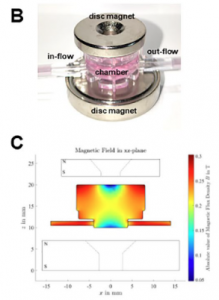Magnetic nanoparticles can render therapeutics or drugs magnetically guidable, which enables their targeted transport to the diseased tissue in the patient`s body. Before its translation into patients, the efficacy of magnetic accumulation must be tested in cell culture systems.
To analyze magnetic enrichment under conditions similar to blood flow, we established an experimental in vitro setup with a tumor spheroid placed in a perfused chamber: with this, we showed that it is possible to accumulate cells or chemotherapeutics at the tumor, increasing their therapeutic efficacy.
Superparamagnetic iron oxide nanoparticles (SPIONs) are used in nanomedicine as transporter systems for therapeutic cargos, or to magnetize cells to make them magnetically guidable. In cancer treatment, the site-directed delivery of chemotherapeutics or immune effector cells to the tumor can increase the therapeutic efficacy in the target region, and simultaneously reduce toxic side-effects in the rest of the body. To enable the transfer of new methods, such as the nanoparticle-mediated transport from bench to bedside, suitable experimental setups must be developed. In vivo, the SPIONs or SPION-loaded cells must be applied into the blood stream, to finally reach the tumor: consequently, targeting and treatment efficacy should be analyzed under conditions which are as close to in vivo as possible.

We conclude that our in vitro setup improves the screening process of nanomedical candidates for cancer treatment.
Jessica Behr, Lucas R. Carnell, Rene Stein, Felix Pfister, Bernhard Friedrich, Christian Huber, Stefan Lyer, Julia Band, Eveline Schreiber, Christoph Alexiou and Christina Janko
In Vitro Setup for Determination of Nanoparticle-Mediated Magnetic Cell and Drug Accumulation in Tumor Spheroids under Flow Conditions – Cancers 2022, 14(23), 5978
Special Issue Tumor Models and Drug Targeting In Vitro
All Resources
Never stop learning!
Check publications from the team, protocols, and useful information to boost your research and get into organ on chip technology!

